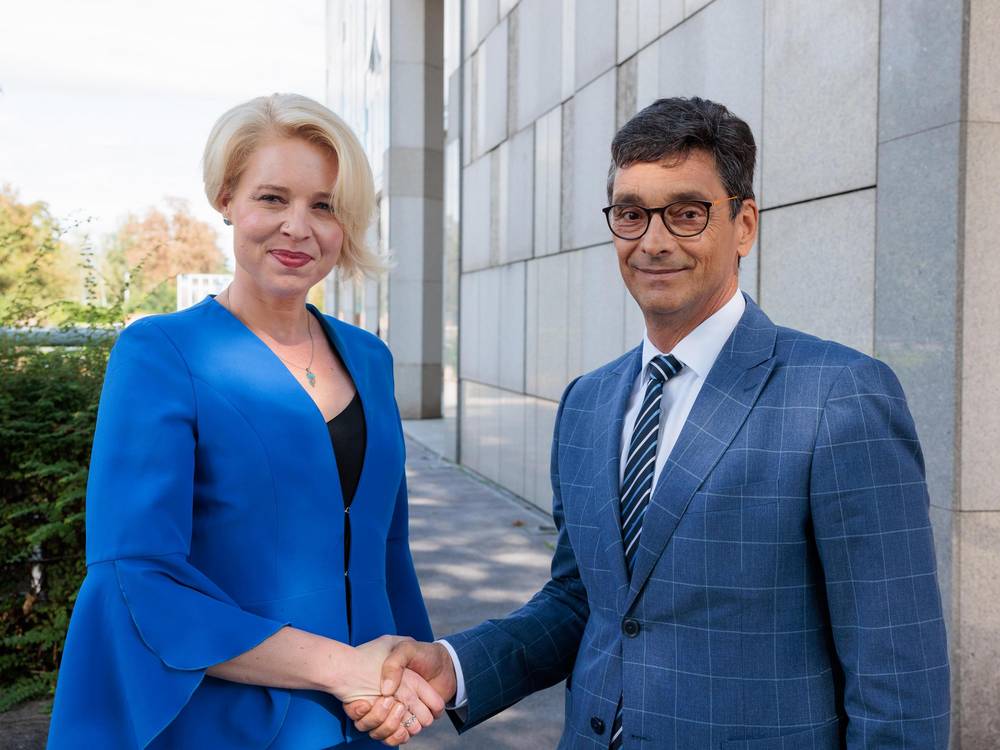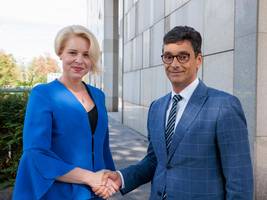On 25 September 2023, the President of the National Assembly of the Republic of Slovenia (DZ), Urška Klakočar Zupančič, MSc, visited the institution of the Human Rights Ombudsman of the Republic of Slovenia. She has met with Ombudsman Peter Svetina on several occasions before, not only upon the annual presentation of the Ombudsman’s Annual Report but also during debates on current events and the state of human rights in Slovenia. On this occasion, Ombudsman Svetina thanked the President for good cooperation. He is satisfied that she has chosen as one of the priorities in her mandate the protection of human rights and fundamental freedoms and that she is committed to addressing the issues brought to the forefront by the Ombudsman promptly and committedly in the National Assembly.
“It is our duty to encourage those responsible to form policies which create equal opportunities for those who do not have them due to their personal circumstances, to ease the consequences of inequality, and to enable everyone to be a full member of society. Unfortunately, those responsible frequently turn a deaf ear to change,” Ombudsman Svetina told the President, as he believes that in order to make shifts for the better, in some ministries certain established patterns of thinking will have to be changed. “It is not only about problems in inter-ministerial coordination, but also that it occasionally appears that there is no will to make agreements. Instead of finding solutions, in some places too much energy is invested in rationalising why something cannot be changed,” said the Ombudsman, issuing a reminder that it is the violation of the principle of good governance in connection with the duty of disclosure of the state that is one of the most violated rights exposed in the current Annual Report.
The President of the National Assembly advocated respect for the role and decisions of the institution of the Human Rights Ombudsman of the Republic of Slovenia, which in addition to other independent institutions represents one of the necessary foundations of democracy and the key cornerstone of the legal order. “Unfortunately, the Ombudsman’s recommendations are not considered as they should be. More than 100 recommendations remain unimplemented from previous years, which reveals the attitude towards the rule of law and towards the institution of the Human Rights Ombudsman, which is an important control institution,” emphasised the President. The Ombudsman added that the decisions made by decision-makers show that in politics it is much easier to criticise the decisions and warn against violations of human rights by others, while it takes much more courage and decisiveness to realise the human rights of all inhabitants, without the authorities depriving or discriminating against them in any way.
The President and the Ombudsman thus committed to more cooperation, the goal of which is not only to search for solutions but to make actual changes in the practice and functioning of the state. “In the last month we have seen that answers to the challenges we face can be very efficiently sought in collaboration. The consequences of the August floods have shown just how humanitarian people are. That we cannot stay indifferent at the sight of shocking events and stories that touch us even though we may be just distant observers. We have proven this on all levels – personal, social, and also on the level of the state,” estimates Ombudsman Svetina. He is convinced that solely relying on systemic or interpersonal solidarity cannot build the relationships of connection in society, but rather that in cooperation we need both.
They agreed that only together can we contribute to forming a society in which a person is first and foremost a fellow human to another person. A society in which everyone who is pushed to the margin can be invited to participate and where we can connect as a community considering the dignity of every person. Svetina also believes that in these times, it is especially important to be part of a society. “People are filled with resentment, which is holding us back. Life needs to be accepted as it is, strive to make it better for everyone, not only individuals, and thus, I believe, we can progress as a society,” he added.
President of the National Assembly visits the Human Rights Ombudsman

Photo gallery
(3)


![[Translate to English:] Pogovor varuha s predsednico državnega zbora](/fileadmin/_processed_/5/4/csm_8T8A1703i_5af45767b3.jpg)